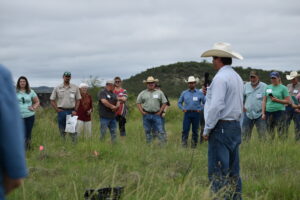 Chris Morris, an Iowa State University Ph.D. candidate in rural sociology and sustainable agriculture, recently did a podcast interview on an Illinois Nutrient Loss Reduction. This podcast is presented by the University of Illinois Extension and hosted by Todd Gleason.
Chris Morris, an Iowa State University Ph.D. candidate in rural sociology and sustainable agriculture, recently did a podcast interview on an Illinois Nutrient Loss Reduction. This podcast is presented by the University of Illinois Extension and hosted by Todd Gleason.
With research, Morris has found that building a relationship of trust between a conservationist and a farmer has had the most positive impact on having conversation practices implemented.
One particular study looked at the effect of Natural Resources Conservation Service conservation plans on adoption. Morris found that interactions between conversation professionals and farmers along with technical assistance was the driving factor of conservation practice adoption.
In another study, Morris worked with the Soil and Water Conservation Society. This studies results showed that the one-on-one technical support in the field with the farmers contributed to the success of farmers using more conservation practices. Despite these findings, most conservationist spend the least amount of time in their job doing this very thing.
In part of Morris’s dissertation, he found that farmers who have experienced trauma often have a hard time when it comes to making decisions, especially when these decisions have potential risk involved.
Morris’s major focus in his research zeroed in on the largest barriers to conservation practice adoption. In addition to research conducted by Pranay Ranjan and Linda Prokopy of Purdue University, the top three factors were economics, incorporating new practices into farm management and social pressure on farmers.
When reviewing Morris’s previous findings, the economics barrier makes sense as farmers who have experienced trauma are hesitant to implement new practices. For most farmers and ranchers, this is their livelihood and if the new implementations were to fail, they could not only lose income but also the farm as well as their way of life.
Some of the key takeaways from his research is that implementation of new conservation practices always comes down to trust. Building those relationships is key, whether it be the conservationist visiting with a group of farmers and ranchers or farmers and ranchers sharing and exploring new ideas among themselves.
For more information on this topic, be sure to check out the News Article and the Podcast.